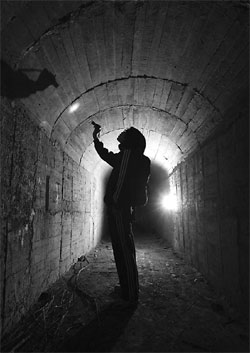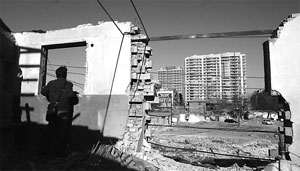| Tools: Save | Print | E-mail | Most Read |
| Search for the City's Ghosts |
| Adjust font size: |
One day in May 2005, 25-year-old Hangzhou native Chen Chu walked up to an abandoned building on Chaonei Dajie, Beijing. Built between 1912 and 1949, the three-story house stands like an isolated island in the surrounding mass of high-rise buildings. But what drew Chen to it were rumors that it is haunted - by the ghost of a warlord's concubine who hung herself to death there. He found the front door locked and walked to the back to see if he could enter. Suddenly, a young foreigner and a Chinese man jumped out from behind a wall, giving him the scare of his life. The two told him that they too, like him, had been drawn to the house out of curiosity.
Chen Chu explores an abandoned air-raid shelter in Beijing. The history of urban exploration (UE) can be traced back to 1793, when Frenchman Philibert Aspairt took his last walk in the catacombs of Paris. Variously known as "drainning" (as when exploring drains), "urban spelunking" or "urban caving", "building hacking", "reality hacking" or "roof and tunnel hacking", UE became popular in the West in the 1980s. The targets of exploration could be anything ranging from abandoned factories, hospitals, cinemas, museums and asylums to historical castles and war ruins. In contrast, urban exploration in China goes back just two years, with Beijing taking the lead and attracting mainly the young, many of whom are IT workers. Abandoned sites in Beijing can be divided into four categories - forbidden places such as underground air-raid shelters and closed metro stations; structures and houses about to be demolished; buildings with a historical background, such as Wan Ning Bridge and Xiliu Palace of the Forbidden City; and haunted houses, like the one Chen first explored.
Recalling that instance, Chen says, "It was a great experience, better than watching horror movies at home." The sales manager of a dot.com company in Beijing has since visited the building several times with friends. He was, at first, rather puzzled to see changes from one visit to the next until it was revealed that the house, that is owned by a construction company, was rented out to theatrical units to make TV dramas. Chen admits to feeling scared at times, but his determination to explore the building is a powerful motivator. His companion, Li Fei, a photographer with Beijing News, echoes his views. Once, when he visited an abandoned cinema, he stepped on what seemed like a human form covered by a quilt and was frightened out of his wits. "My heart beating violently, I summoned up the courage to draw back the quilt. And guess what I found. Just wooden pipes," Li recalls with a laugh. Yet, Chen doesn't encourage people to explore on their own. Move in groups of at least two or three, he says. "Friends and colleagues always provide tips on places of interest for exploration. However, most just join us for one time and then never appear again," Chen says. Usually, Chen and Li make their trips on weekend afternoons. So far, the two have explored more than 10 abandoned sites, including Niu Jia Village in the southwest of the city and a few abandoned villas in the outskirts. Instead of feeling depressed by their bleak and desolate looks, they find the decay of these places beautiful and unique. "It is hard to find an area without streetlights and empty of people in the downtown areas. When in an abandoned building, I feel like I own the place even if for a very short time. For me, this sense of victory is what I find most enchanting," Li says. "Urban exploration gives me a break from the routine and leads me to another world, where I can just be myself, " Chen says. Many of the members at www.chinauer.com - China's largest such website launched at the end of 2004 - are young girls, who prefer to explore at night. The registered members, ranging in age from 18 and 40, now stand at more than 40,000 throughout the country. The founder Xing Sammi, who is also an IT worker, is a veteran urban explorer. The young girl in her mid-20s defines UE as a sport that should be popularized. "It costs little money and no elaborate equipment. Besides, most activities take place in the city, so you don't need to spend a lot of time on transportation. "What's more important, it fosters friendship between complete strangers," she says. According to Xing, any member can initiate an activity by posting a notice on the website. A team can be put together as long as more than five members apply for it. The team also uploads photos and tips on their return from the explorations. It usually takes at least one or two hours to investigate an abandoned site. But some trips have to be given up, owing to legal restrictions, hostile squatters or even inaccurate sites. "The rapid pace of urban development also poses difficulties. Some abandoned houses that are only just mentioned on the website today might be demolished tomorrow," she says. Despite these drawbacks, Xing says her passion for urabn exploration remains as strong as ever. She recalls once entering an abandoned hall where a huge portrait of Chairman Mao was placed in the middle of the front wall, with red slogans hanging on its side. She says she felt like she had been transported back into the 1960s. "This is something we will never encounter when we sit in an office building, doing the same job everyday." But there are also the risks to explorations posed by collapsing roofs, sharp nails, broken glass, the presence of chemicals and other harmful substances. Yang Xiong, vice-head of the social development institute at the Shanghai Academy of Social Sciences, believes urban exploration provides an avenue for young people to relieve the stress of living in big cities. "Rapid urban expansion has provided few opportunities for the young generation, especially those born in the 1980s, to understand the history of the city and enjoy nature. Urban exploration fills this gap," Yang says. (China Daily July 12, 2007) |
| Tools: Save | Print | E-mail | Most Read |
 |
| Related Stories |

